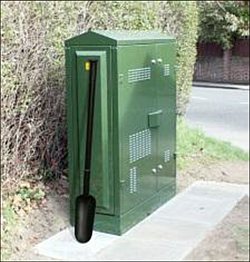 No surface is too tough for superspade. Grass and soil it doesn’t even notice. This baby likes to flex its muscles by digging up tarmac. In fact it is so soft on your hands that labourers using it are often mistaken for office workers (until they ask for four sugars in their tea and give the game away).
No surface is too tough for superspade. Grass and soil it doesn’t even notice. This baby likes to flex its muscles by digging up tarmac. In fact it is so soft on your hands that labourers using it are often mistaken for office workers (until they ask for four sugars in their tea and give the game away).
Most people have a whinge about BT somewhere in their portfolio of anecdotes. Last week I found myself in the slightly unusual position of heaping praise on the company! Now I’m adding more positive comments!
unusual position of heaping praise on the company! Now I’m adding more positive comments!
BT Group has announced a series of innovations that on the face of it are largely aimed at reducing the cost of digging in fibre. These include:
- a new spade that can cut through tarmac eliminating the need for a separate “civils “team
- micro-trenching for faster deployment in environmentally sensitive areas
- a mini DSLAM to provide cost effective coverage for low density areas and multi-tenant dwelling units (ie blocks of flats)
- conductive concrete – a cost effective option for meeting electrical safety needs and which lowers civils costs
- a polymer based plinth that allows faster, lower cost all-weather deployment and which is environmentally friendly and
- a power supply infrastructure that removes the need for a meter installation visit and reduces deployment time by two weeks.
I can almost hear the deep intakes of breath and the look of amazement on your faces as you read this. I’m not sure whether your incredulity is down to not believing that BT could innovate in this space or whether you think that these developments are not particularly significant.
Well actually whilst each of these innovations may seem trivial what they collectively do is send out a signal that BT is trying to do something about the aspect of it’s business that is often criticised as being one of the barriers to cost effective fibre broadband rollout (FTTC & FTTP) and that is the cost of digging trenches.
When the Caio Report came out in 2009 it quoted a figure of £29Bn as the cost of rolling out fibre to every home in the UK. Of this something like £24Bn was supposedly the civil engineering cost.
Looking at it simplistically you can see that halving the cost of the civil engineering effort has a massive effect on the total cost of the network roll out with, presumably, a knock-on positive effect on the business case.
I have no idea how the announcements herein will affect the overall costs for BT. Only time will tell. For now at least the messaging is right.